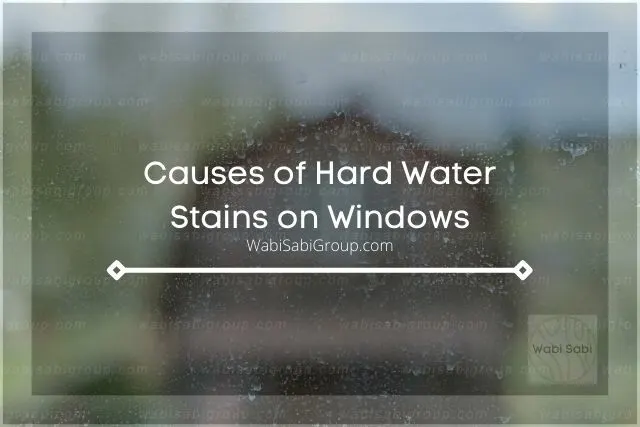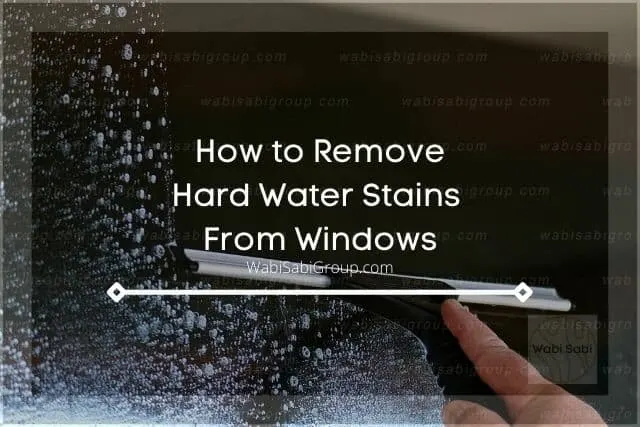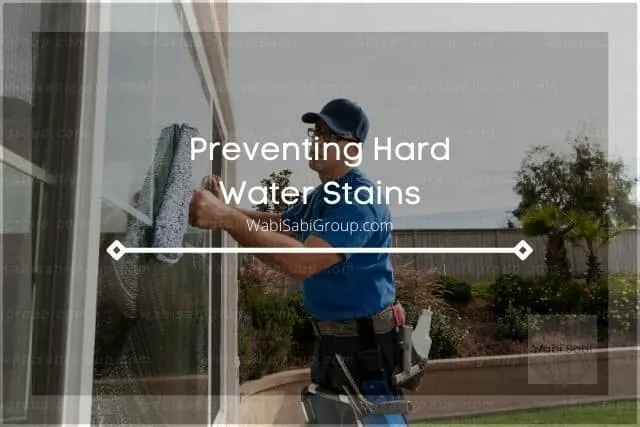Removing hard water stains from windows can feel like a daunting task, but you don’t have to worry. With the right knowledge and techniques, you can restore your windows to their original, spot-free state. This article will outline some effective methods to help you tackle this problem and leave your windows looking crystal clear.

Hard water stains occur when minerals, particularly calcium and magnesium, are left behind after water evaporates. These unsightly marks can be stubborn and resistant to regular cleaning methods, so knowing how to efficiently combat them is crucial to maintaining the appearance of your windows. From simple household items to commercial products, we’ll explore various options suited for different levels of hard water staining.
As you read on, you’ll be equipped with the essential information and strategies necessary to understand and remove hard water stains from your windows. This will not only improve your home’s aesthetics but also allow you to enjoy a clear view of the outdoors.
Causes of Hard Water Stains on Windows

Hard water stains on your windows are a common issue due to the mineral content in the water. When water evaporates, it leaves behind calcium, magnesium, and other minerals that can create a crusty, white residue on your windows. In this section, you’ll learn about the leading causes of hard water stains and how they appear on your windows.
One of the primary reasons for the occurrence of hard water stains on windows is the type of water supply in your area. If your water is classified as “hard,” it contains a high concentration of minerals. This is especially true in regions with a heavy reliance on well water or where water is sourced from limestone or chalk deposits.
Exposure to rainwater is another cause of hard water stains on your windows. Rainwater may contain minerals and airborne contaminants, such as dirt and pollution particles. As the rainwater evaporates from your windows, these contaminants are left behind, causing stains and spots.
Moreover, the use of sprinkler systems to water your lawn or garden can also result in hard water stains on your windows. As the water droplets from the sprinklers hit your windows, they can leave behind mineral deposits.
Finally, ineffective or inappropriate window cleaning methods can contribute to hard water stains. Using hard water to clean your windows or not fully removing cleaning solutions can leave residue behind, contributing to the buildup of hard water stains over time.
In summary, hard water stains on windows are caused by various factors, including the type of water supply, exposure to rainwater, sprinkler systems, and inappropriate cleaning methods. By understanding these causes, you can take preventive measures to minimize the occurrence of hard water stains on your windows.
How to Remove Hard Water Stains from Windows

Removing hard water stains from windows can be a tricky process. Here are a few methods you can try in order to keep your windows looking clean and clear.
Using Vinegar
- Mix equal parts white vinegar and distilled water in a spray bottle.
- Spray the solution directly onto the hard water stains.
- Allow it to sit for a few minutes.
- Wipe away the solution with a soft cloth or sponge and rinse the area with clean water.
- Dry the glass with a clean towel or microfiber cloth to prevent the formation of new water spots.
Using Lemon Juice
- Cut a lemon in half.
- Rub the cut side of the lemon directly on the hard water stains.
- Allow the lemon juice to sit for a few minutes.
- Rinse the area with clean water.
- Dry the glass with a clean towel or microfiber cloth to prevent the formation of new water spots.
Using Baking Soda
- Mix baking soda with water to make a paste.
- Apply the paste directly onto the hard water stains with a soft cloth or sponge.
- Gently scrub the area to loosen the mineral deposits causing the stains.
- Rinse the area with clean water.
- Dry the glass with a clean towel or microfiber cloth to prevent the formation of new water spots.
Commercial Cleaners
- Choose a commercial cleaner specifically designed to remove hard water stains.
- Read and follow the instructions on the product packaging.
- Apply the cleaner as directed to the stained glass.
- Wipe or scrub the stains, depending on the cleaner’s instructions.
- Rinse the area with clean water, if necessary.
- Dry the glass with a clean towel or microfiber cloth to prevent the formation of new water spots.
Preventing Hard Water Stains

Regular Cleaning
To prevent hard water stains on your windows, it’s essential to clean them regularly. Make it a part of your routine to wipe down the windows with a soft cloth at least once a week. This will help reduce the buildup of minerals and keep your windows looking their best. Additionally, using a mild cleaner specifically designed for windows can help prevent damage and discoloration caused by hard water.
Water Softeners
Investing in a water softener for your household water supply can substantially reduce hard water stains on windows and other surfaces. Water softeners work by removing minerals such as calcium and magnesium from the water, which are responsible for causing hard water stains. By softening your water, you can prevent these minerals from building up on your windows and other surfaces, making cleaning much easier in the long run.
Applying Protective Coatings
Another effective method for preventing hard water stains on your windows is to apply a protective coating. There are various products available on the market specifically designed to shield your windows from minerals and other contaminants found in hard water. Some protective coatings can repel water, while others create a barrier that prevents mineral deposits from forming. By applying a protective coating to your windows, you can make them more resistant to hard water stains and prolong their lifespan.
Remember to follow the manufacturer’s instructions when applying any protective coating, as each product may have different specifications for proper application and maintenance. Regularly maintaining the protective coating on your windows will help ensure maximum effectiveness in preventing hard water stains.
This article was first published on May 25, 2023 by Wabi Sabi Group..
Top Takeaways
When dealing with hard water stains on your windows, it’s essential to address the issue promptly and effectively. Here are the key takeaways on how to remove hard water stains from your windows:
- Use a vinegar solution: Create a 50/50 mixture of water and plain white distilled vinegar in a spray bottle. This inexpensive and effective solution is ideal for tackling mineral deposits. Spray onto the stained area, let it sit for a few minutes, and then wipe with a soft cloth or paper towel.
- Try the lemon approach: Cut a lemon in half and rub it directly onto the glass, applying a fair amount of pressure. The natural acidity in the lemon works effectively at breaking down hard water deposits, making it easier to clean your windows.
- Prevent future stains: An excellent preventative measure is to use a squeegee on your windows regularly. By removing excess water before it dries, you can significantly reduce the buildup of hard water spots.
- Be persistent and patient: Removing hard water stains can require some time and effort. You might need to repeat the cleaning process multiple times before the stains are entirely gone. It’s essential to remain diligent and keep at it until your windows are spotless.
By following these top takeaways, you’ll be well-equipped to handle and prevent hard water stains on your windows, ensuring they remain crystal clear and sparkling clean.
Related Articles
What Can You Use To Clean a Humidifier?
What Can You Use To Clean a Beauty Blender?
What Can You Use To Clean Shutters/Blinds? (How To)
WabiSabi Group is the owner of this article and was published on May 25, 2023 and last modified on .
